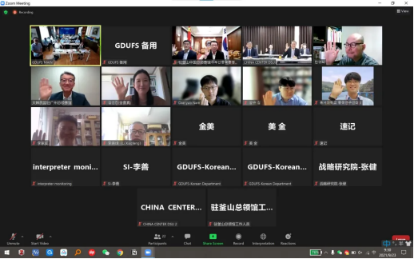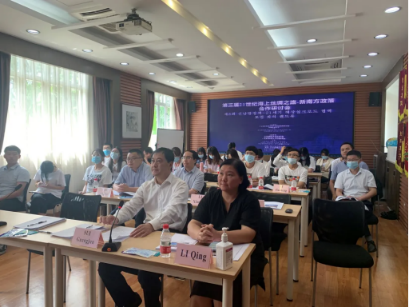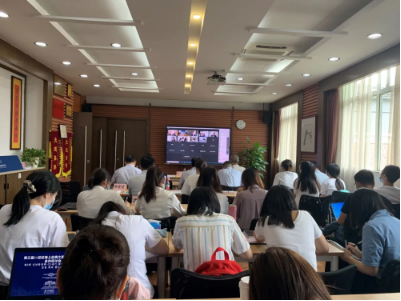On September 23th, 2021, with the support of the Chinese Consulate General in Busan, the Korean Consulate General in Guangzhou, and the Huangpu Research Institute of Guangdong University of Foreign Studies, the 3rd China 21st Century Maritime Silk Road-ROK New South Policy Cooperation Academic Seminar, co-hosted by Guangdong Institute for International Strategies and Dongseo University in South Korea was successfully held in China and South Korea. Professor Sui Guangjun, Secretary of the Party Committee of Guangdong University of Foreign Studies, SHIN JUNG SEUNG, former South Korean ambassador to China and Dean of East Asian Research Institute of Dongseo University, Guo Peng, Chinese Consul General in Busan, and HAE JAE HUN, South Korean Consul General in Guangzhou, attended the forum and delivered speeches. Well-known experts and scholars from home and abroad attended the conference to discuss the “China-Korea Cooperation under RCEP”. Professor Li Qing, Secretary-General of GIIS and Executive President of Huangpu Research Institute hosted the opening ceremony.

Site of the online meeting
Professor Sui Guangjun, Secretary of the Party Committee of GDUFS and Executive Vice President of GIIS, pointed out that through this seminar, we jointly discuss how the two countries can further work together to meet challenges, promote regional economic integration, make Asia the most dynamic region with the highest growth potential in the global economy, and drive globalization to be more open, inclusive, equal and mutual beneficial. The above topics are crucial for China and South Korea to explore the trends, opportunities and adjustments of development and cooperation in Asia and the world in the new normal and post-pandemic era.

SHIN JUNG SEUNG, former South Korean ambassador to China and Dean of East Asian Research Institute of Dongseo University, said that RCEP plays a positive role in trade and economic growth between China and the ROK. He hoped that researchers from China and South Korea will have in-depth discussion on the significance of RCEP and how to strengthen China-ROK cooperation under the framework of RCEP at today’s seminar.
Guo Peng, Chinese Consul General in Busan, expressed his expectation that this seminar will play a more active role in publicizing RCEP, promoting the high-quality development of China and South Korea, and strengthening practical cooperation between the two sides. He also said that the Chinese Consulate General in Busan will also continue to provide active assistance to promote exchanges and cooperation between Guangdong and the Yeongnam region in South Korean.
HAE JAE HUN, South Korean Consul General in Guangzhou, said that on the 30th anniversary of the establishment of diplomatic relations between China and South Korea, we are facing with new challenges and opportunities for China-ROK relations. Looking into the future, we must make greater efforts to seek greater development. He believed that there will be a lot of gains from studying the new model of China-ROK cooperation under the RCEP framework.
This forum focuses on “China-South Korea Cooperation under RCEP”. Two issues were discussed in the forum. Topic 1 was chaired by Professor Chen Weiguang of the Advanced Research Institute of GIIS, discussing the China-ROK people-to-people and cultural exchanges under RCEP.
Topic 1: China-ROK people-to-people and cultural exchanges under RCEP
Associate professor Li Jiacheng from the School of International Economics and Politics of Liaoning University pointed out that China-ROK people-to-people and cultural exchanges have a promising future, but there is still a long way to go. Such exchanges between China and South Korea have been carried out sporadically before the establishment of diplomatic ties. Since the establishment of diplomatic relations, bilateral exchanges have made further progress based on a solid political foundation, and exchanges between governments have gradually increased. Governmental and non-governmental exchanges are equally valued.
Professor MIN KWI SIK from department of Chinese Studies in Hanyang University focused on “China's Maritime Silk Road Strategy and ASEAN’s Response”. By analyzing problems faced by China and ASEAN in port cooperation, he expected China to make breakthroughs in promoting people-to-people bonds.
Professor Cheng Yonglin from GIIS discussed whether the RCEP will promote the reconstruction of the value chain of Asia-Pacific region by analyzing the main contents of RCEP, bilateral trade and competitiveness in trade between China and other signatory countries, trade complementarities between China and the 14 RCEP countries, and the regional value chain effects of the agreement.
Professor LEE KYUNG MI from department of Chinese Language in Dongseo University pointed out that people-to-people and cultural exchanges are the core and long-term goal in long-term exchanges between China and South Korea at all levels. Besides, it is expected to be a new model of East Asian cooperation in the 21st century to promote active exchanges in comparative literature studies and share statistics and research results related to women’s studies.
Zhang Zhiming, Associate Professor from School of Economics and Trade of Guangdong University of Foreign Studies, shared his research on the evolution of China-South Korea value chain cooperation model and its influencing factors. He put forward that there is still more room to explore the value chain cooperation between China and South Korea in the future, especially the bilateral in-depth service value chain cooperation in manufacturing and service industries. Such cooperation can serve as an important breakthrough to promote the healthy, stable and sustainable development of China-South Korea cooperation in the future.
Professor KIM TAE MAN, Director of the National Maritime Museum and Korea Maritime and Ocean University, shared China-ROK people-to-people and cultural exchanges-marine civilization exchange and cooperation plan. It is planned to take the 30th anniversary of the establishment of diplomatic relations between China and South Korea as an opportunity to combine maritime civilization education with the “Belt and Road” initiative by holding national exhibitions related to the history of maritime civilization exchanges and cooperation between China and South Korea to promote cultural cooperation between China and South Korea.

Issue 2 was chaired by LEE HONG GYOO, Director of the Center for Chinese Studies at Dongseo University, discussing the China-ROK economic and technological cooperation under RCEP.
Issue 2: China-ROK economic and technological cooperation under RCEP
Professor Li Xiaofeng, Counsellor of People’s Government of Guangdong Province, focused on new opportunities for China-ROK economic and trade cooperation under the RCEP Framework in the post-pandemic Era. He put forward that in the post-pandemic era, the signing of RCEP will contribute to economic and trade connectivity between China and the ROK and inject more vitality into the economic growth of the two countries. He believed that with the signing of RCEP, the economic and trade cooperation between China and South Korea will be further improved, and the quality of cooperation will also be further enhanced.
Associate professor KIM SUN JIN from department of Chinese Studies of Dong-A University shared his researches on China's digital health care industry and cooperation China-ROK cooperation programs with the focus on Guangdong Province and Busan City. He pointed out that Asian countries will be encouraged to strengthen economic cooperation under the RCEP framework if a leading public health and medical smart model that combines the advantages of China and South Korea can be successfully built.
Professor NAM DAE YUP from department of Chinese Studies in Keimyung University sorted out the historical development of trade balance of major RCEP members, taking China, Japan, South Korea, ASEAN and Australia as a comparison object for analysis. He said that for common development and mutual peace among RCEP member countries, each other’s efforts are needed to manage the trade balance. He said RCEP members need to manage trade balances for mutual development and peace.
Professor Zhong Zuchang, Deputy Secretary General of GIIS, focused on the cooperation and development of high-end manufacturing regional value chain between China and South Korea under RCEP. He suggested that, in view of the practical basis of the industrial cooperation of the two countries, it is necessary to explore new cooperation and development concepts based on strategic docking, collaborative innovation, complementary development, openness and inclusiveness. He also suggested that optoelectronic equipment and automobile manufacturing should be taken as key industries for cooperation and breakthroughs, and cooperation in areas associated with new energy, blockchain, chip manufacturing, 5G and artificial intelligence should be vigorously promoted.
KIM SANG KYOU, professor of Academic Studies in Hanyang University focused on China-ROK scientific and technological cooperation under RCEP. He put forward that science and technology can help China and South Korea achieve common development and maximize mutual interests. Besides, bilateral scientific and technological cooperation can be divided into two aspects: cooperation in original technology and building a cooperation platform. Especially in fields associated with digital finance and healthcare, more substantial and efficient results are expected to be achieved.
Professor Han Yonghui from GIIS focused on the theme of “Comprehensively promoting the construction of Qianhai-Hengqin ‘Dual Zone’ and empowering the high-quality development of the Guangdong-Hong Kong-Macao Greater Bay Area”. He thought that the introduction of Hengqin plan and Qianhai Plan will bring great opportunities for the “Belt and Road” Initiative and China's opening-up to the outside world, and will help the Guangdong-Hong Kong-Macao Greater Bay Area to further integrate comprehensively and deeply with other countries in various fields, especially with South Korea.
Professor Sun Churen, Deputy Secretary-General of GIIS, analyzed the comparative advantages of China and South Korea’s export products from 1996 to 2017, and pointed out that changing pattern of comparative advantages of China and South Korea's export products are similar. Besides, there is significant competition between the two countries in bulk commodities and homogeneous products, but there is a certain degree of complementarity in products with greater differences.
At this forum, experts from China and South Korea jointly discussed how the two countries can further work together to tackle challenges, promote regional economic integration, make Asia the most dynamic region with the highest growth potential in the global economy, and drive globalization to be more open, inclusive, equal and win-win.
